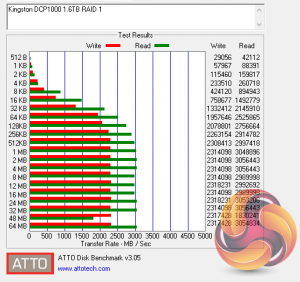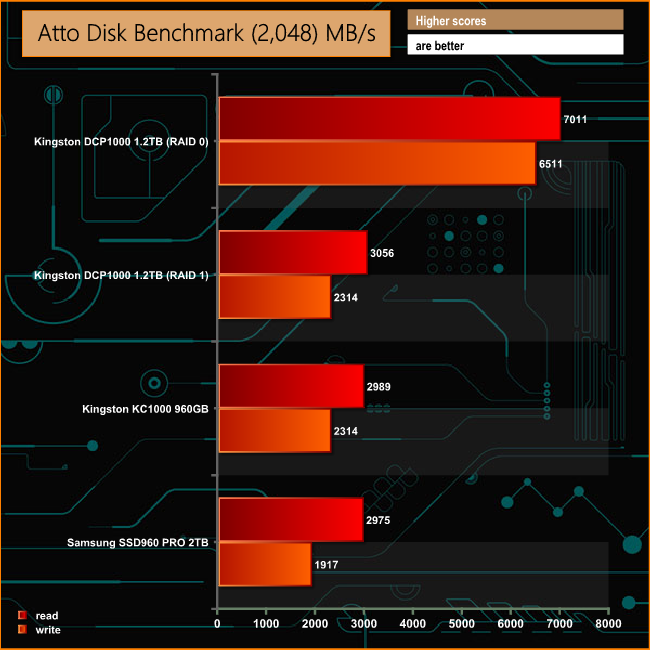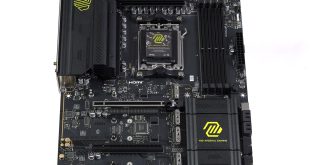The ATTO Disk Benchmark performance measurement tool is compatible with Microsoft Windows. Measure your storage systems performance with various transfer sizes and test lengths for reads and writes. Several options are available to customize your performance measurement including queue depth, overlapped I/O and even a comparison mode with the option to run continuously.
Use ATTO Disk Benchmark to test any manufacturers RAID controllers, storage controllers, host adapters, hard drives and SSD drives and notice that ATTO products will consistently provide the highest level of performance to your storage.


Kingston quote Sequential Read/Write figures for the 1.6TB version of the DCP1000 at 6,800MB/s and 6,000MB/s respectively. Tested under the ATTO benchmark, the review drive even bettered those with reads at 7,011MB/s and writes at 6,511MB/s in RAID 0. When the DCP1000 is built as a RAID 1 array, these figures drop to 3,056MB/s for reads and 2,314MB/s for writes, still hugely impressive.
To give an idea of just how fast this drive is we've added scores from the Kingston KC1000 drive, which is another PCIe HHHL format card but with a single M.2 SSD attached to it and the Samsung SSD960 PRO, one of the fastest consumer M.2 drives currently available.
 KitGuru KitGuru.net – Tech News | Hardware News | Hardware Reviews | IOS | Mobile | Gaming | Graphics Cards
KitGuru KitGuru.net – Tech News | Hardware News | Hardware Reviews | IOS | Mobile | Gaming | Graphics Cards




Would it be possible to do game load times in benchmarks? Some engines, e.g. Frostbite, REDengine, RAGE, are extremely impacted by SSD/HDD performance so it’d be great to see how much of an impact such a product has on loading times.
What is the MTBF for this drive? Given the read write times. Normal day to day and say video editing on a daily basis?
“Stated endurance for the 1.6TB drive as a whole is 1820TB TBW with each of the 400GB drives rated at 375TB TBW”
Depends how much you write per day. 100GB/day would give an estimated 18200 days. 1TB/day would give an estimated 1820 days.
I’ve got a 950 Pro for close to 2 years, that’s now hit 40TB written (rated 400TBW), it’s used as a buffer drive for recordings, temp drive, and to store games on.
I’ve also got a 960 Evo, had it for about a year, is only used for OS and smaller apps like office / photoshop etc, that’s now at 6.8TB written, (rated 100TBW).
Edit: also both drives have only gone down to 99% drive life remaining according to SMART, despite having used 10% and 6.8% of their rated writes. Google the ssd endurance test, some drives almost made 2000 TBW before failing outright, and thats a few years old.
Edit edit: have a look at this;
http://www.guru3d.com/news-story/endurance-test-of-samsung-850-pro-comes-to-an-end-after-9100tb-of-writes.html
That would be interesting to see, especially with comparisons against other drives in similar raid arrays as this raid on card